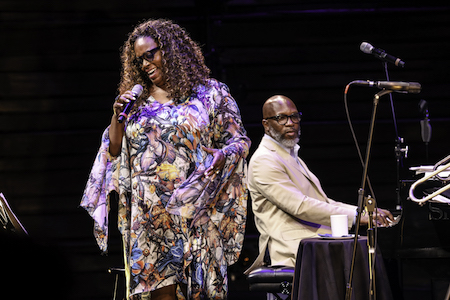Jan 13, 2026 2:09 PM
More Trump-Kennedy Center Cancellations
The fallout from the renaming of the John F. Kennedy Center for the Performing Arts to include President Donald…

Dianne Reeves and Orrin Evans onstage at D.C. Jazz Fest.
(Photo: Jati Lindsay)Fostering bridges is Orrin Evans’ modus operandi as he fulfills his duties as artist-in-residence at the D.C. Jazz Fest. In this year-long position, which runs through early 2023, the pianist and composer is creating channels that allow musicians of different generations, genders, geographical locations and styles to commingle on various bandstands. He pulled off that goal superbly on Sept. 2 at the 18th annual D.C. Jazz Festival when a rambunctious nine-piece edition of his Captain Black Big Band joined forces with the majestic Dianne Reeves.
The pairing (made possible, in part, by a South Arts grant) initially seemed at once provocative and probable. Evans often steers his Captain Black Big Band in treacherous waters where singable melodies and buoyant rhythms often dissipate into dissonant harmonies, disquieting improvisations and jagged propulsion. During much of the past two decades, Reeves has usually fronted streamlined ensembles of trusted musicians — pianist Peter Martin, drummer Terreon Gully, bassist Reginald Veal, guitarist Romero Lubambo — that allow her rich contralto to sashay elegantly through a varied program of jazz, Brazilian, pop and soul standards and well-crafted originals.
Neither Evans nor Reeves, however, are captives of any idiomatic persuasions. Both come to the table with immense canonical jazz knowledge. More beneficial, though, they exhibit a genuine curiosity at exploring both new and unlikely repertoire without losing their respective distinctive artistic visions.
In front of the Arena Stage at the Mead Center for American Theater’s packed audience, the Captain Black Big Band commenced the concert with a snarling reading of Thelonious Monk’s “Off Minor.” As drummer Mark Whitfield Jr. and bassist Luques Curtis thrusted the bebop classic with combustive energy, the six-man horn section, consisting of two saxophonists, two trumpeters and two trombonists, blasted out the prancing melody with a capriciousness that recalled the Sun Ra Arkestra. Tenor titan Caleb Wheeler Curtis issued a spiraling improvisation against the rhythm section’s torrent momentum. Equally scintillating solos from trumpeter Charlie Porter and alto saxophonists Todd Bashore eventually followed. The music’s sonic density nearly drowned out Evans’ piano playing. But when he did emerge from underneath harmonic tsunami, he ticked out a coruscating solo that used the prancing melody as a launching pad to create ribbons of curvaceous improvisational passages, punctuated with harmonic jolts and jagged ellipses. The ensemble concluded “Off Minor” with a hypnotic hip-hop vamp that connected to everlasting modernity of Monk’s legacy with 21st century pulses.
While the adventuresome nature of its treatment of the Monk classic set the tone for the rest of Captain Black Big Band’s first-half set — especially on its intriguing rendition of Andrew Hill’s “Tough Love,” on which Evans’ spoken-word dialogue offered timely social commentary on the need for unconditional love amidst insurmountable duress — its avant-garde characteristics didn’t prohibit palliative sensibilities to surface. That was evident in Evans’ sumptuous arrangement of Roy Hargrove’s waltz ballad “Into Dawn,” which highlighted riveting trumpet playing from David Gibson and a mesmerizing piano from Evans as he enlivened the wistful melody with suspenseful pauses and tumbling passages and “Hymn,” a chorale-like ballad that featured only the horn section.
If the first half demonstrated the Captain Big Band’s propensity for ferocity, when Reeves joined, it showed it had enormous capacity for finesse. The ensemble provided a luxurious cushion for her as she delivered a captivating retooling of Fleetwood Mac’s bruising pop classic “Dreams” and “Chan’s Song (Never Said),” a transfixing Herbie Hancock-penned ballad that was first featured in Bertrand Tavernier’s 1986 movie Round Midnight then later on Reeves’ 1987 eponymous Blue Note album with lyrics written by Stevie Wonder.
Reeves and the Captain Black Big Band reached its emotional peak with a sanguine performance (and first big band treatment) of her signature composition, “Better Days,” on which she pays homage to her grandmother, and on the glimmering rendition of Bob Haggart and Johnny Burke’s composition “What’s New?” She also demonstrated her long-established affinity with Brazilian jazz with a dazzling makeover of João Bosco’s “Incompatibilidade De Gênios,” on which her gorgeous alto sauntered across an infectious samba rhythm, intersected by slicing horn lines.
Reeves ignited an undeniable rapport with Evans’ Captain Black Big Band in an enthralling performance that one hopes is just the first of more collaborations to come. DB

Belá Fleck during an interview with Fredrika Whitfield on CNN.
Jan 13, 2026 2:09 PM
The fallout from the renaming of the John F. Kennedy Center for the Performing Arts to include President Donald…

Peplowski first came to prominence in legacy swing bands, including the final iteration of the Benny Goodman Orchestra, before beginning a solo career in the late 1980s.
Feb 3, 2026 12:10 AM
Ken Peplowski, a clarinetist and tenor saxophonist who straddled the worlds of traditional and modern jazz, died Feb. 2…

The success of Oregon’s first album, 1971’s Music Of Another Present Era, allowed Towner to establish a solo career.
Jan 19, 2026 5:02 PM
Ralph Towner, a guitarist and composer who blended multiple genres, including jazz — and throughout them all remained…

Rico’s Anti-Microbial Instrument Swab
Jan 19, 2026 2:48 PM
With this year’s NAMM Show right around the corner, we can look forward to plenty of new and innovative instruments…

Richie Beirach was particularly renowned for his approach to chromatic harmony, which he used to improvise reharmonizations of originals and standards.
Jan 27, 2026 11:19 AM
Richie Beirach, a pianist and composer who channeled a knowledge of modern classical music into his jazz practice,…